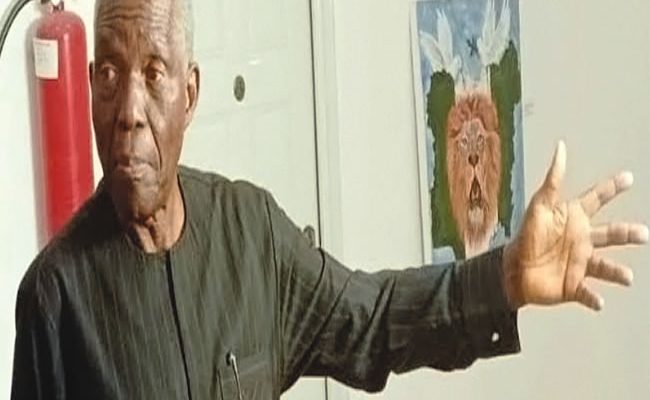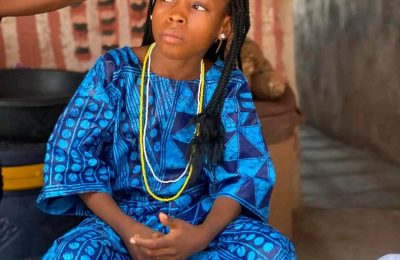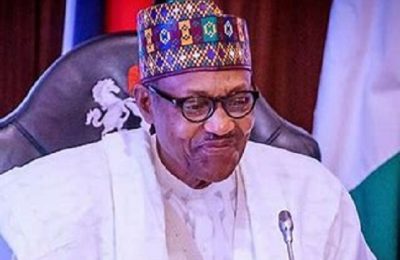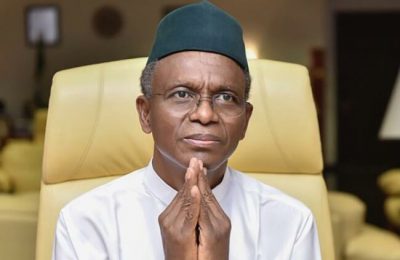
Mr. Kevin Ejiofor served as Executive Director and later acting Director-General of the Federal Radio Corporation of Nigeria (FRCN) after returning to a station he joined as a rookie just one year before the Nigerian civil war. He tells SAM NWAOKO his exciting media voyage.
How did your journey in the media world begin?

I was working as a clerk at the National Archives in Abadina Village in the University of Ibadan straight from secondary school. Then I was transferred to Enugu. At the end of one year, I was MCing the Christmas party of the department and the husband of our telephone operator came to pick her and heard me. At the end of the party, he called me and said ‘what are you doing here?’ I told him I was working there and he said ‘why do you speak English like that and you are working here?’ He said he was going to talk to some people in Radio Nigeria and see if there was a vacancy or whatever. He came back after about two months and said an advertisement would be appearing in the Daily Times on a certain Thursday in November 1965. I saw the advertisement, I went to Radio Nigeria, they gave a form and I filled it. By the end of that month I was called for an interview with others including those who were already working there. I was employed. However, approval had to come from Lagos so they sent to Lagos. I now later learnt that there was a disagreement between the controller of the station in Enugu and the head of programmes in Lagos. Their disagreement was that the man in Lagos couldn’t understand how somebody who was not working – an outsider – could come first above some of the people who were already working in Radio Nigeria, including as studio managers and announcers as they were called then. Apparently, this dragged on for a while. The man in Lagos suspected that the man in Enugu was bringing in his relatives whereas the man had never seen me before in his life. The thing went on until January and there was a coup and everything was suspended. Then, somewhere in May, I was called up to come and start work. I started working at Radio Nigeria Enugu Station. It was called East Regional Station of the Nigerian Broadcasting Corporation. I started as an announcer on the 18th of May, 1966.
Shortly after that, that man who was in charge of Enugu Station, Mr. Sam Nwaneri, came to the studio one day and said to me: ‘Listen, I’m sending you off to Port Harcourt. It seems that you have a future in broadcasting and I want to give you the advantage of starting from the very grassroots’. In those days, Calabar, Onitsha and Port Harcourt were the East Regional sub-stations for Enugu. In other words, the nearest to the grassroots were those stations called the Provincial Radio Stations. In those days, you come to the market or any public place you will see a loudspeaker booming out programmes from what was Radio Nigeria at the time. So, I went there as green as anybody could be and took charge of the station until August 1967 when the Civil War broke out and I had to return to Enugu. In Enugu, we were all swept away by the war and we ran from place to place. We came back after the war and resumed in Enugu again.
In the sense of those days, except those in the news department, we were not referred to as journalists. We were broadcasters. Those who were in the news department and the news section were the ones who were called journalists and they belonged to the Nigeria Union of Journalists (NUJ). We did not belong to the NUJ, we were more like the glamour people of radio of those days; we were the ones whose voices were heard. Some of our colleagues made most of that while some of us didn’t think too much about that.
How much of that glamour did you enjoy because you rose to act as the Director-General of the FRCN?
That is like jumping some 55 years ahead! As announcers we were called – they call themselves on-air personalities OAPs now – we read the news. You just read the news, your voice was the thing. We came back from the war in 1970; by 1971 I thought just reading news and the glamour of it wasn’t tasking enough. So I joined the outside broadcast where I did sports commentaries and produced sports programmes and so on. I didn’t last long there but I kept doing it along the way because they thought I could do it. Then I joined features where you could produce programmes, stretch issues and presented them as features, documentaries and so on. That was where I spent a long time from 1972 until I was then transferred to Enugu and back to Lagos. I went to Voice of Nigeria (VON) as a producer in charge of Southern African programmes. In those days, Nigeria was called the “frontline country” along with Zimbabwe and some others. I was covering events, I went to cover the Zimbabwe Independence and their elections; I went to the Olympic Games; travelled with the president’s entourage to many places – Yugoslavia, Britain, Hungary etc. I was doing those things and at the same time still reading news, there was a roster that covered everybody who could read news, including those who were working in the newsroom. So, that allowed me to work in all departments. I was a news reader, a broadcaster; I ran a programme called “Just a Chat”, it was a very popular interview programme. I interviewed celebrities of those days: Stanley Macebuh, Dele Giwa and some big soldier-names and so on and so forth. It was very rich repertoire of activities I had in Lagos throughout the 70s.
I went again to Enugu, then came back to Lagos and stayed till 1985 before I left radio and went to old Anambra State comprising what is now Anambra, Enugu and Ebonyi states, as the director of information for the government. That was my first time of being in the civil service proper. I spent four years there. It was very enriching but the civil service was a bit constricting in its way. Luckily for me, I was invited to join Cadbury Nigeria Limited (now PLC) as the media relations and corporate affairs manager. I was there for eight years and by then, I was becoming an old man. I stayed there from 1989 till 1997 when I became 60 years old and had to retire. I left Cadbury as a senior manager in the corporate affairs department.
You could be said to have seen it all. You’ve been in the broadcast industry; you’ve been in government and also in the private sector. You saw the civil war, worked during the military and civilian administrations. What were some of the risks you took as an active young man that time?
I haven’t seen it all but I’ve seen quite a bit. When Radio Biafra was making all the required noises, boosting morale, annoying Nigerians and those who were opposed to Biafra, it was very tasking. There was no electricity, there was nothing. Sometimes, I wrote my script lying on the floor on a mat with only oil lamp we call Mpanaka as light, and produced my programmes. All of that was very taxing. You could produce your programme in the night and in the morning you would not be able to broadcast because the station was being taken down and you had to move to another place – from Enugu to Aba; Aba to Umuahia; Umuahia to Obodo Ukwu where the war ended. So, I haven’t seen it all but I have seen quite a lot. It was a very taxing, very exciting and very stretching time – emotionally, physically and spiritually. It is an experience I’m grateful for because we learnt a lot about human nature; about things that happen; about why they happen and how they happen.
I kept a diary for every single day during the war. Unfortunately, when the war was ending we had this impression that we would all be in prison for life or be killed or something like that. So, a few of us gathered our tapes and our diaries and programmes, dug a pit and burnt everything only to return to Nigeria… All the information we had gathered, we couldn’t use them and they were nowhere to be found. It was one of the painful parts of the war. But we came back, started again especially for those of us who were in Radio Nigeria, we were extremely lucky. The Reverend Erasmus Badejo was a very liberal man. He never believed that those who left because of the war were anything but who they were as human beings. So, the happy family of radio Nigeria was reunited almost as if nothing had happened.
The four years I worked in Anambra State in the civil service showed me that the civil service is where all the best things and all the worst things are formulated for the country. This is what happens in the civil service. The advice and guidance of the civil service to political office holders and so on, if you ignore that, it is at your own risk. I retired as a director of information in the old Anambra State and so I saw how government functioned. That was in the military era. In my view, the political era made things worse and made the civil servant more dangerous and more powerful.
You now see why I said you have seen it all?
No, I disagree. I’ve seen quite a bit but not all. Some people might have seen it all but I have not.
This is because of your rich and diverse repertoire of experience
I even ran my own company. After I left Cadbury Nigeria PLC I set up Image Consultants in Lagos. It was while I was there that I was invited back to Radio Nigeria in 2002 to head the Enugu National Station. Then, it was challenging because by then it was democracy. President Olusegun Obasanjo was preparing for elections for his second term and the boss of Radio Nigeria then, Dr Eddie Iroh, thought that the Enugu National Station needed strengthening, in his own perception. So, he invited me back. I didn’t think it was going to happen – I didn’t know you could get a job like that without having to lobby and so on. I later discovered that he sent a letter to the Minister of Information, Professor Jerry Gana who sent the letter to the President who approved. At that time, it was called Executive Director. I took up the job and worked there till November 2005 when Eddie Iroh had to leave and I was told to come and act. I didn’t see myself as wanting to be Director-General for four years because I was 67 going on 68. Those were the days of the third term rumours. That was when I met at close quarters my friend, Professor Tonnie Iredia, one of those very special people in Nigeria and in the media. He was in charge of TV, I was in charge of radio and we bonded. One of the things we did together with me as the spearhead of it was the reconstruction and restructuring of what used to be known as URTNA, Union of Radio and Television National Stations of Africa. I inherited the headship of that for all Africa and one day we had a meeting in Senegal and I said to them “I can’t be coming to meeting here every time taking estacodes. This thing is not working, let’s be honest.” There was a branch in Kenya, there was another one in Algeria and in Burkina Faso and Senegal was the headquarters. We set about restructuring it because it was dying. Many African countries could not afford to pay their dues – Nigeria, South Africa, Algeria, Senegal to some extent were the main thrust. So I closed the station in Algiers, in Burkina Faso and Kenya and brought everything to Senegal. I went about asking international sports bodies to start supporting URTNA and that was how we began to get slots for the International Olympics Committee; FIFA and all of that. For that the man who took over from me invited me to the World Cup in South Africa in 2010, all expenses paid. That was the first reward I was able to get in that kind of sense.
That sounds like that was one of the best decisions you took as acting DG of FRCN?
I was persuaded and almost bludgeoned by my friend, Eddie Iroh to take the position. I was very reluctant to take the position because I felt I was too old to be running round again. I think it was one of the best decisions I took certainly because of the best opportunities I had. However, I cannot take all the credit, Eddie Iroh can take most of the credit and some of my friends who pushed me to go back to all of that.
After that, I came back to Lagos. I applied for and got a radio license and I was the lead promoter of City FM in Lagos and was the pioneer managing director. While there, I made some mistakes and those who know better than me about money and these things came and I had to withdraw honourably. I left everything, sold my shares and came out of the place feeling very unhappy but good by the way I came out because it left me without rancour or quarrel with anybody.
When you look at professionalism then and now, especially when you made your second coming, how would you rate professionalism?
Let us be fair, everybody regards their past as better than their present. That is the meaning of the saying: “The good old days”. Sometimes, you can say that is a justified statement but often it is like comparing apples and oranges because no time is like the next time or the other time. Yes, people like me have strong reservations about how things are happening now in the media. We see in some of our best newspapers that there is confusion with “Been” and “Being” but then, the young people are used to the computer which is self-correcting. They no longer bother with spelling because the computer does it for them. So, it is not a fair judgement to say people are illiterate now. It is the same thing when I listen to people reading the news when they call names from other parts of the country and just pronounce them anyhow. In my time, it was a very grievous offence. I remember my first news bulletin in Lagos. On Page 5 of that bulletin was the name: Aderibigbe. I had to go ask from Yoruba persons how to pronounce it and they told me, I marked it. When I started reading, I remembered that on page 5, this name occurred and my heart started pounding from then on. By the time I got there, I’m sure I called something that deserved a stroke of the cane. My head of presentation at that time, the late great Mari Irikefe was standing by the door and I had to apologise. Those kinds of troubles they don’t take it anymore. At that time we were almost the only people. There was OGBC nearby and that was all. NBC was the prime prima dona. Now, in Enugu for instance, you can hear all of 12 stations – there are eight in Enugu and those from nearby states. But they are not taking trouble to edit.
There could be more emphasis on professionalism but it is the money that dictates everything now. It is the rating – how many people are listening to you? Which companies are going to place adverts with you? The economy is going down, people are in a hurry and they no longer worry about things they should be worried about and so on and so forth.
However, professionalism, in some other ways, is much improved. Some of my favourite columns or people I want to hear what they think about are in the newspapers. There is one in Tribune, there is one in The Punch, and there is one in This Day. In radio and TV, many presenters are freely opinionating. This could not have happened in our time, it wasn’t possible. You were supposed to be neural and be the man to just help people make sense of what is going on, don’t voice opinions. Station anchors on radio voice opinions now. However, I don’t think it is fair to say oh my time it was better, I would say in my time it was different. The circumstances were different. Circumstances created the kind of needs they have to meet. Some of the things that were off the table like religion and tribe should be the things they should not exacerbate or not to inflame. Now, freely, people are being called to television and radio and are being pushed into saying things that are not desirable except in the case of very few controlled individuals.
What was the difference with these circumstances in your time?
These things are prompted by politicians. These politicians need only one thing in their life: Money in their pockets by occupying certain positions. They need those kinds of things to be able to get to the positions and we are not being strong enough to resist them. There is not enough assurance that we could be protected if we resisted them. There is no safety net; it is not as if you were Piers Morgan in Britain and you can leave one station and walk into another because you are good at this job. So, it requires deep personal spiritual grounding to be able to stand up to those people. I had my share of that in Enugu when I came back. There was a dispute between two people in the PDP – a senator who came from Abuja and held an interview programme on my station. The governor brought a written announcement, paid for it to be put on my station. The statement was saying something the man had not said in my station. I told them I would not take it. He said ‘listen, the party in power in Enugu is telling you to do this’. I told him ‘the party in power sir told me to do my job, I am doing my job. This is my job.’ By then, I was nearly 70 years old, there was not much he could do to me other than to ask me to go home. If I hadn’t provided for my future then, it was my fault too. That was the kind of safety net and character that enabled me to stand up to people like that. How many young people will be able to do that? The economy is bad, they can’t walk off and set up that little thing there or another company. So, the temptations are more deeper and more vicious and more compelling because the power elite all over Nigeria have no respect for the people of Nigeria. They have power to divide and rule and they do divide and rule and the division is what all professions in Nigeria are suffering. All professional people have to fight against this power to divide and rule.
If you were to correct some things in your career, what would you have done differently?
As the lead promoter of City FM, I probably did not have enough aptitude for business. I did not cover the business angle. I probably should have allowed somebody with business training or experience, from the beginning, instead of being the managing director. Sometimes, you can overrate yourself. You are a broadcaster and so on and so forth and you don’t look deeply enough to know that there is more to it than putting content on radio. It is a question of managing the thing as a business, and probably I had some of the wrong people. It was some of my mistakes that led to that. I also could have done what many of my colleagues were doing while we were at work. I could have set up a little media outfit and develop a second income stream. I never had the inclination, it never occurred to me. It is a weakness. I put my whole head and heart and soul into whatever I was doing as a broadcaster and whatever I was doing. So, until I retired, I had no business. If this idea of City FM and founding a station hadn’t occurred, I probably would have just died while sleeping one day out of poverty. But I was lucky City FM gave me a certain scale, working with an engineer I began to help people set up their own radio stations and earn a little money.
People don’t do reality checks. People like me were just happy doing the best job in the world – sorry for those of you in the newspaper. The best job in the world is radio and TV. While you are wrapped up in that you can forget that there is life after that. How are you going to cope with life? Life doesn’t end in the studio or in the newsroom or in writing stories and getting excited writing exclusives. Put a little to the side and remember that this would end someday. Those are the kind of things one could have done differently. I think I was lucky. I was mostly working with people who favoured or liked me. Broadcasting gave me opportunities to travel around the world and I even had a stint at the BBC at a certain time.
READ ALSO FROM NIGERIAN TRIBUNE







